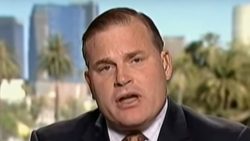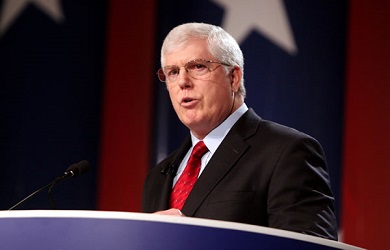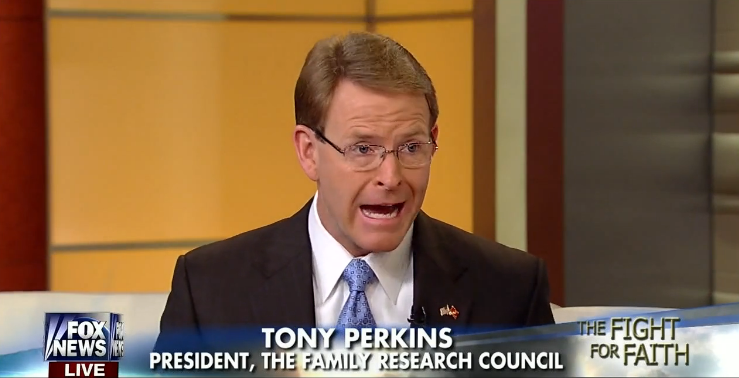The Senate Judiciary Committee is holding a hearing today on the nomination of Kyle Duncan to a lifetime seat on the Fifth Circuit Court of Appeals. Duncan is one of several of Donald Trump’s judicial nominees who have been affiliated with conservative legal organizations that are working to remake American law to protect discrimination in the name of religious freedom.
The Religious Right has so far been thrilled with Trump’s nominations to the federal courts, in part with the hope that Trump’s judges will endorse the movement’s effort to rewrite the meaning of religious liberty. With Duncan and others, Trump is attempting to put representatives of this movement directly on the bench.
Duncan previously served as the general counsel of the Becket Fund for Religious Liberty. Matthew Kacsmaryk and Jeff Mateer, who have both worked for First Liberty Institute, are nominated to district court seats in Texas. As Sarah Posner notes in an in-depth profile of the Alliance Defending Freedom yesterday, Duncan and Mateer are also among the four Trump judicial nominees with ties to the behemoth conservative legal group, which has done more than any other to promote the radical reimagining of religious liberty.
Mateer’s nomination has gotten the most attention of these, given his comments about transgender children being part of “Satan’s plan,” his invocation of Nazi Germany in discussing the current treatment of conservative Christians in America, and his decision to speak at a conference that featured considerable discussion about the death penalty for gay people. But like Mateer, Duncan and Kasmaryk are poised to bring the ideology of the Religious Right, dressed up in the movement’s carefully calibrated talking points about religious liberty, into the federal courts.
Duncan worked for two years as the general counsel of the Becket Fund for Religious Liberty, where he led the litigation on behalf of Hobby Lobby, the craft store chain that claimed that offering its female employees health care coverage for birth control would violate its religious liberty. Our affiliate PFAW Foundation adds:
Becket has also represented a handful of religious institutions challenging the contraception mandate under the Affordable Care Act, and attacking the Obama administration’s accommodation for those with religious objections. Becket clients argue that even informing the government of their objections is a substantial burden on their religious liberty because that act would trigger the accommodation mechanism that would provide women with contraceptive coverage through other means. Becket accuses the Obama administration of working to push people of faith “to the margins.”
Duncan also served as a member of Marco Rubio’s “religious liberty advisory board” in 2016.
Alliance for Justice notes in a report on Duncan that he has also authored briefs supporting Texas’ restrictions on abortion access and opposing marriage equality and has “repeatedly attacked the rights of same-sex couples attempting to adopt children.”
Kacsmaryk is currently the deputy general counsel at First Liberty Institute, another Religious Right legal group that has made a name for itself by arguing that conservative Christians are being persecuted at the hands of a secular government and advocates of reproductive freedom and LGBTQ rights.
Kacsmaryk appears to have been part of a meeting with Trump administration officials in July at which First Liberty lobbied for “broad” exemptions in contraception coverage rules. In a press release, Kacsmaryk said he was fighting against “the government’s effort to punish business owners and ministry leaders for following their religious beliefs and moral convictions.”
In his writings, Kacsmaryk presents a view of the world in which the products of the “sexual revolution” are up against America’s Christian foundation. AFJ describes his response to comparisons of the LGBTQ rights movement and the civil rights movement:
Kacsmaryk wrote that the civil rights movement “was rooted in the soil of the uniquely American Judeo-Christian tradition, spearheaded by Christian leaders, and was essentially ‘moderate’ in its demands.” In contrast, the “Sexual Revolution,” “was rooted in the soil of elitist postmodern philosophy, spearheaded by secular libertines, and was essentially ‘radical’ in its demands.”
In his work at First Liberty, AFJ reports, Kacsmaryk was categorically opposed to any nondiscrimination protections for LGBTQ people:
Indeed, Kacsmaryk appears to have opposed any effort to ensure equality for LGBTQ persons. For example, while at the First Liberty Institute, he opposed a rule clarifying that hospitals receiving Medicare and Medicaid cannot discriminate against patients based on sexual orientation and gender identity, opposed Department of Labor regulations clarifying that discrimination on the basis of gender identity was prohibited under the Workplace Innovation and Opportunity Act, opposed federal housing regulations to add gender identity to anti-discrimination provisions in community planning and development programs, opposed gender identity and sexual orientation nondiscrimination rules in the Affordable Care Act, and opposed nondiscrimination clauses in the Homeless Youth and Trafficking Prevention Act and the Violence Against Women Act 2013 reauthorization bill. Kacsmaryk and the First Liberty Institute also represented the owners of an Oregon bakery that denied services to a same-sex couple because of their sexual orientation.
As a sign of how extreme Kacsmaryk is, when Republicans and Democrats in Utah reached a compromise to prohibit employment and housing discrimination based on sexual orientation or gender identity with a broad exemption for religious organizations, Kacsmaryk opposed the bill. The bill was sponsored by Republicans, passed a Republican legislature, was signed by a Republican governor, and supported by countless religious groups. Moreover, its exemption was so broad that it was progressives who raised the most concerns with the bill (for example, writing “Utah ‘Compromise’ to Protect LGBT Citizens From Discrimination Is No Model for the Nation”). Significantly, Kacsmaryk did not oppose the bill on the grounds that the religious exemption was insufficient, or that it imposed too great a burden on religious persons. Rather, he opposed it on grounds that businesses and landlords should be able to discriminate against LGBTQ Americans[.]







